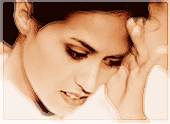PMS and Conventional Treatments
 While the causes of PMS still evade us, there are several circumstances that we know seem to predispose women to the condition. So, you’re more likely to suffer from PMS if you’re between the ages of 30 and 50, or if you’ve had more than one child, have given birth recently, had a termination or miscarriage, or have had several pregnancies in quick succession. PMS also appears to run in families, so if your mother suffered from the condition, you’re more likely to suffer from it, too.
While the causes of PMS still evade us, there are several circumstances that we know seem to predispose women to the condition. So, you’re more likely to suffer from PMS if you’re between the ages of 30 and 50, or if you’ve had more than one child, have given birth recently, had a termination or miscarriage, or have had several pregnancies in quick succession. PMS also appears to run in families, so if your mother suffered from the condition, you’re more likely to suffer from it, too.
The following are the most common medications prescribed to women who suffer from PMS.
Ovulation suppressors The contraceptive pill, danazol (a weak male hormone), and GnRH analogues all have the effect of suppressing ovulation by various hormonal actions on the body, and you may be prescribed any one of these. However, they all also have unwelcome side-effects, including some of the symptoms of PMS itself, such as mood swings, and menopausal-like symptoms, such as hot flashes. Your doctor may suggest you wear estrogen patches, which some women find offer relief from symptoms. However to bear in mind that these are basically hormone replacement therapy (HRT), which carries with it some serious side effects.
Progesterone supplements Some experts believe that PMS may result from low levels of progesterone in the second half of your cycle, so your doctor may prescribe a synthetic form (known as progestin or progestogen) of this hormone. It’ll raise your progesterone levels to reduce your symptoms. In the USA, women are able to buy (literally over the counter) what’s known as “bioidentical” progesterone – that is, progesterone that is chemically identical to the progesterone produced in your ovaries. It’s usually available as a cream or a pessary. However, to make things really clear, although bioidentical hormones match the chemical structure of the natural versions, they’re still powerful hormonal drugs. Taking a synthetic hormone is not the same as using a wholly natural help to balance your hormones.
Specific symptom relief If you suffer from PMS-related breast pain, your doctor may prescribe the drug bromocriptine. It’s side effects include nausea, vomiting, and headaches, and I personally think its effects are too strong to justify its prescription for PMS symptoms alone. For help with bloating, your doctor may give you diuretics, which help your body to flush away fluids – and vital nutrients, too.
Surgery Surgery is the most drastic option your doctor could recommend to treat PMS. The logic is that if you don’t have a menstrual cycle, you can’t have PMS. In order to prevent he cycle, a doctor can suggest removing your ovaries. However, doing so sends you into immediate menopause, which means you‘d then have to take estrogen-only HRT to protect your bones. Please make sure you’ve considered all the options –including the natural approach – before you consider this serious surgery.
Because the causes of PMS elude us, conventional medicine teds to relieve only its symptoms – if you take medication for PMS and then stop, your symptoms will return. For this reason alone, I urge you to try the natural methods first. With nutrition, herbal, and lifestyle approaches, you can treat not only the symptoms but also the causes (even the ones we don’t know about yet!), for long-lasting relief. Many of the patients have eliminated their PMS symptoms completely using natural approach. You should allow three months to see the full effects, but you should start see an improvement after even one cycle.
It can take up to five years to get a diagnosis of PMS.

